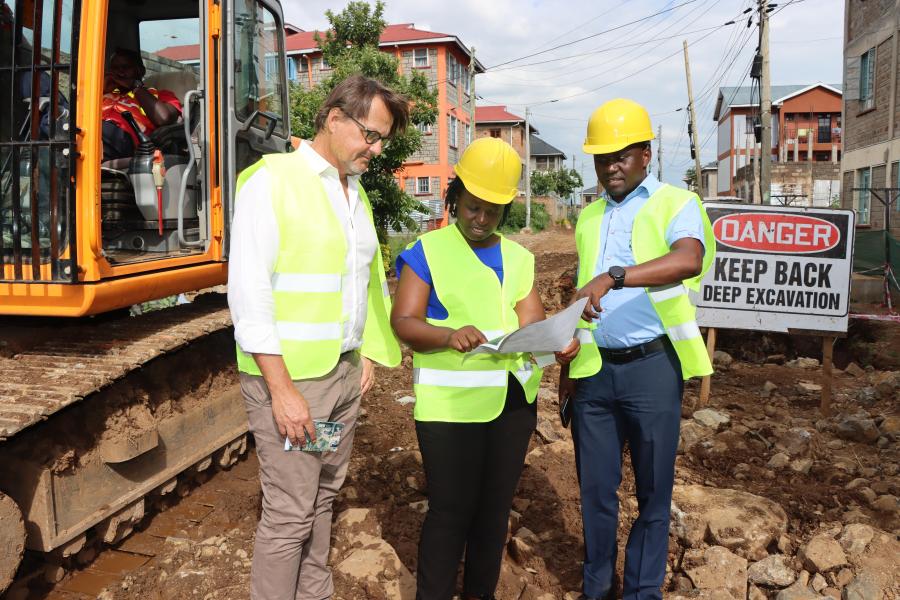
The European Investment Bank (EIB Global) has made available over €1.2 million (over KSh 166 million) in technical assistance support to cities in East Africa for the preparation of climate-resilient urban development projects.
The cities set to benefit from this technical assistance are Kericho, Nyamira, Kisumu, Embu, Eldoret and Malindi in Kenya as well as Zanzibar in Tanzania and Makindye in Uganda.
EIB Global’s support for cities is financed through the City Climate Finance Gap Fund – a multi-donor trust fund supported by Germany and Luxembourg and implemented jointly with the World Bank and in close partnership with German Development Cooperation (GIZ). The technical assistance programme focuses on early-stage project preparation with the aim of facilitating access to finance for urban projects that would otherwise potentially remain at the idea stage.
Most of the support for the cities in the region will revolve around assessing options for managing solid waste and faecal sludge, waste-to-energy solutions through production of biogas, and wastewater treatment. Preliminary proposed solutions have recommended integrated solid waste management plans that encompass segregation of waste at source, separation of waste collections, waste recovery and proper disposal.
Further technical assistance promotes active mobility through evaluating non-motorised transport options, implementing urban flood proofing measures to mitigate flood risks and enhancing environmental sustainability through the establishment of green public parks as well as expansion of urban forestry and biodiversity.
In Kenya, EIB Global’s support is geared towards helping the cities access further financing support from an ongoing infrastructure investment programme known as the Kenya Urban Support Programme II, upon completion of the Gap Fund technical assistance.
EIB Vice-President Thomas Östros said: «Cities and local governments play a key role in fighting climate change because they experience its effects the most. However, they often struggle to develop climate-resilient infrastructure, mainly due to a lack of resources and expertise to create strong, investment-ready projects. Through its support for the Gap Fund, the EIB helps cities bridge these gaps and prepare effective climate projects.»
Technical assistance for project preparation plays a vital role in facilitating the implementation and financing of climate action projects by presenting bankable opportunities. This is particularly true at urban or sub-national level where local authorities sometimes do not have enough in-house capacity to prepare robust projects that can attract public and private finance providers at an international level.
The European Investment Bank is very active in urban climate finance, especially through the City Climate Finance Gap Fund. The Bank works with other partners to advise on projects that will place cities on a path to net zero.
Background information
About EIB Global
The European Investment Bank (ElB) is the long-term lending institution of the European Union, owned by its Member States. It finances investments that contribute to EU policy objectives.
EIB Global is the EIB Group’s specialised arm devoted to increasing the impact of international partnerships and development finance, and a key partner of Global Gateway. We aim to support €100 billion of investment by the end of 2027 — around one-third of the overall target of this EU initiative. Within Team Europe, EIB Global fosters strong, focused partnerships alongside fellow development finance institutions and civil society. EIB Global brings the EIB Group closer to people, companies and institutions through our offices across the world. High-quality, up-to-date photos of our headquarters for media use are available here.
About the City Climate Finance Gap Fund:
Cities are key to creating a climate-smart future. Over half the global population lives in cities, generating 80% of total economic output and accounting for 70% of global CO2 emissions. While urbanisation is a key driver of growth, unplanned rapid urbanisation and urban sprawl threaten to increase greenhouse gas emissions and vulnerability to climate change and other shocks. As many cities and local governments take steps to become low-carbon and climate-resilient, they face barriers in accessing finance as well as difficulties in planning and project preparation, due to insufficient capacity or resources – particularly in the early stages of the project cycle. The Gap Fund supports cities in addressing these specific challenges.
On 20 September 2023, the governments of Germany and Luxembourg announced new funding of €50 million for the City Climate Finance Gap Fund, a multi-donor fund, implemented by the World Bank and the European Investment Bank with partners. These resources will support the development of low-carbon and climate-resilient urban investments and will nearly double the fund’s capitalisation, bringing it to €105 million, one of the largest early-stage technical assistance funds for cities and climate.
It provides much-needed funding for early-stage technical assistance and capacity building so that cities from low and middle-income countries can operationalise their climate action plans, develop robust project concepts, and access climate finance resources. Since its establishment in 2020, the EIB has supported 137 cities in developing and emerging economies through the Gap Fund.

EIB Global Assists Cities Develop Climate Resilient Urban Projects in East Africa
©EIB
Download original

EIB Global Assists Cities Develop Climate Resilient Urban Projects in East Africa
©EIB
Download original

EIB Global Assists Cities Develop Climate Resilient Urban Projects in East Africa
©EIB
Download original

EIB Global Assists Cities Develop Climate Resilient Urban Projects in East Africa
©EIB
Download original
